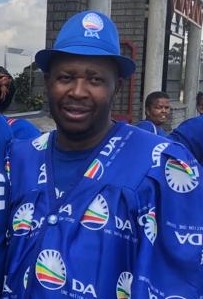Related Research Articles

South Africa is divided into nine provinces. On the eve of the 1994 general election, South Africa's former homelands, known as Bantustans, were reintegrated into the country, and the four provinces were increased to nine by dividing Cape Province and the Transvaal into three and four, respectively. The twelfth, thirteenth and sixteenth amendments to the Constitution of South Africa changed the borders of seven of the provinces.

The Constitution of South Africa is the supreme law of the Republic of South Africa. It provides the legal foundation for the existence of the republic, it sets out the rights and duties of its citizens, and defines the structure of the Government. The current constitution, the country's fifth, was drawn up by the Parliament elected in 1994 in the South African general election, 1994. It was promulgated by President Nelson Mandela on 18 December 1996 and came into effect on 4 February 1997, replacing the Interim Constitution of 1993. The first constitution was enacted by the South Africa Act 1909, the longest-lasting to date. Since 1961, the constitutions have promulgated a republican form of government.

The Republic of South Africa is a parliamentary republic with a three-tier system of government and an independent judiciary, operating in a parliamentary system. Legislative authority is held by the Parliament of South Africa.
The Western Cape province of South Africa is governed in a parliamentary system in which the people elect the Provincial Parliament, and the parliament elects the Premier as head of the executive. The Premier leads a cabinet of provincial ministers overseeing various executive departments. The provincial government is subject to the Constitution of the Western Cape and the Constitution of South Africa, which together form the supreme law of the province.

The Western Cape Provincial Parliament (WCPP) is the legislature of the Western Cape province of South Africa. It is located at 7 Wale Street in Cape Town.
Qubudile Richard Dyantyi has represented the African National Congress (ANC) in the National Assembly since 2019. Before that, he was a Member of the Western Cape Provincial Parliament and served as the Western Cape's Member of the Executive Council (MEC) for Local Government and Housing from 2005 to 2008. In 2021, he was elected chairperson of the national parliament's Committee for the Section 194 Enquiry into Busisiwe Mkhwebane's fitness to hold office.
In South Africa, a Premier is the head of government of one of South Africa's nine provinces. The Premier of a province plays for that province a role similar to that played by the President for the country as a whole.
In the Western Cape province of South Africa, Member of Provincial Parliament (MPP) is the designation given to members of the Western Cape Provincial Parliament.

The Constitution of the Western Cape is, subject to the Constitution of South Africa, the highest law regulating the structure and powers of the government of the Western Cape province of South Africa. It was enacted by the Western Cape Provincial Legislature in terms of Chapter 6 of the national constitution, and came into force on 16 January 1998. The Western Cape is the only South African province to have adopted a constitution.
The nine provinces of South Africa are governed by provincial governments which form the second layer of government, between the national government and the municipalities. The provincial governments are established, and their structure defined, by Chapter Six of the Constitution of South Africa.
The provincial councils were the legislatures of the four original provinces of South Africa. They were created at the foundation of the Union of South Africa in 1910, and abolished in 1986 when they were replaced by a strengthened executive appointed by the State President. The four provincial councils were the Cape Provincial Council, the Natal Provincial Council, the Transvaal Provincial Council and the Orange Free State Provincial Council.

A provincial election was held in the Western Cape on 7 May 2014 to elect a new provincial parliament. It was the fifth provincial election held since the end of the apartheid era, and also the first held since the death of Nelson Mandela. Although not constitutionally required, the election was held simultaneously with elections to the National Assembly. The legislature is unicameral, and consists of 42 members elected by a system of party-list proportional representation.

Beverley Ann Schäfer is a South African politician serving as the Deputy Speaker of the Western Cape Provincial Parliament since May 2019. She served as the Western Cape Provincial Minister of Economic Opportunities from November 2018 to May 2019. Between June 2014 and October 2018, she served as the Chairperson of the Portfolio Committee on Economic Opportunities, Tourism and Agriculture in the provincial parliament. She was the Cape Town City Councillor for Ward 54 from 2011 to 2014. She is a member of the Democratic Alliance (DA).

An indirect mayoral election was held at a special sitting of the Cape Town City Council on 6 November 2018 to determine the successor of former mayor Patricia de Lille after she resigned on 31 October. Former mayor and Provincial Minister of Community Safety, Dan Plato, of the Democratic Alliance won the election as the party holds a two-thirds majority in the city council.
Mireille Mary Wenger is a South African politician who has been the Western Cape Provincial Minister of Finance and Economic Opportunities since May 2022 and a Democratic Alliance (DA) Member of the Western Cape Provincial Parliament since May 2014. She was Chief Whip of the Majority Party from May 2019 to May 2022.
Brett Norton Herron is a South African politician and attorney who has been a Member of the National Assembly of South Africa since February 2022. He was a Member of the Western Cape Provincial Parliament from May 2019 until February 2022. Herron is the secretary-general of the GOOD party. He was the party's candidate for Mayor of Cape Town in the 2021 municipal elections.

Nceba Ephraim Hinana is a South African politician of the Democratic Alliance who served as a Member of the National Assembly of South Africa from May 2019 until his resignation in March 2023. He was a Member of the Western Cape Provincial Parliament from May 2014 to May 2019.

Denis Joseph is a South African politician from the Western Cape. A member of the Democratic Alliance, he was elected as a permanent delegate to the National Council of Provinces in 2011. He served in the NCOP until his election to the Western Cape Provincial Parliament in 2014. After the 2019 election, Joseph returned to Parliament to serve as an MP in the National Assembly.
Siphokuhle Patrein is a South African politician and a member of the National Assembly of South Africa from the Western Cape. Patrein is a member of the African National Congress.
Matodzi Mirriam Ramadwa is a South African politician. A member of the African National Congress, she was elected to the Limpopo Provincial Legislature in 2009. In 2013, she was appointed as the Member of the Executive Council (MEC) for Sports, Arts and Culture. Ramada was elected as the speaker of the provincial legislature in 2014. In 2015, she resigned as speaker. Ramadwa was elected to the National Assembly of South Africa in 2019.
References
- "Legislation made by the Western Cape Provincial Legislature". LegalB. Retrieved 19 March 2011.